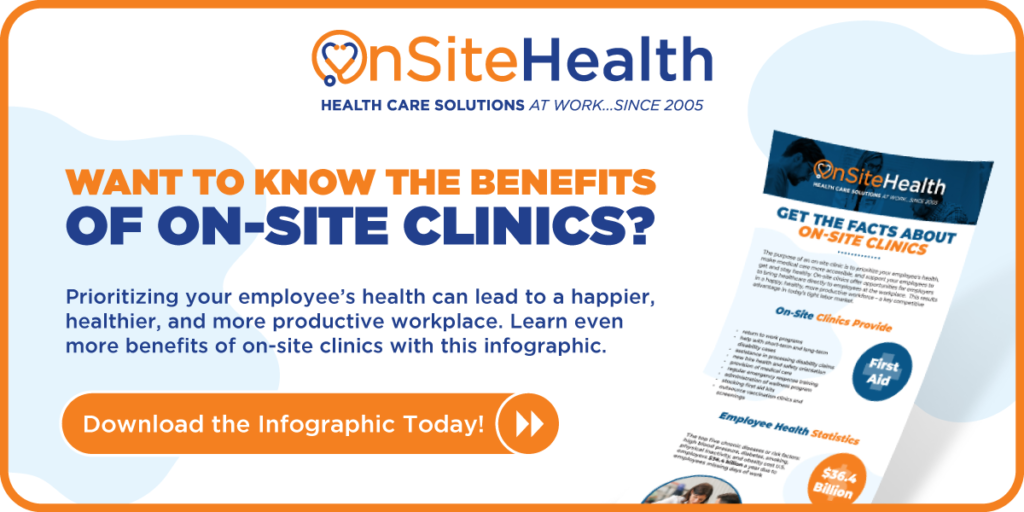Cholesterol is a waxy substance in your blood that your body needs to build cells; therefore, it’s essential for good health. However, too much cholesterol poses a threat to your health. Let’s explain why it is important to lower cholesterol levels.
Staff an OnSite Health Nurse and Save
>>Click Here for our ROI of On-site Nurses Flyer<<
What is Cholesterol and Why is it Important to Lower Cholesterol Levels?
Cholesterol is a lipid that regulates the expansion of cell membranes. Your liver makes most of the cholesterol your body needs from the food you eat. Meat, poultry, full-fat dairy products, and processed foods are the most common sources of cholesterol in our diets. These foods are high in saturated and trans fats that cause your liver to make more cholesterol. Although eating these foods in moderate amounts is fine, too much of it can lead to unhealthy cholesterol levels.
As the amount of cholesterol in your blood increases, so does the risk to your health. High cholesterol puts you at a higher risk for cardiovascular disease, heart disease, stroke, etc. This is why it’s important to have your cholesterol level tested, so you can determine if your levels are healthy.
How is Cholesterol Measured?
High cholesterol usually causes no symptoms: the only way to determine if you have a healthy cholesterol level is by testing it. Your test results may be different from others: it depends on your age, gender, health history and other factors. A complete cholesterol test includes the measurements of four types of fats in your blood:
Total Cholesterol: Total cholesterol is the sum of your blood’s cholesterol content. Here are the ranges:
- Normal: Less than 200 milligrams per decaliter (mg/dL)
- Borderline high: 200 to 239mg/dL
- High: At or above 240mg/dL
Low-density Lipoprotein (LDL) Cholesterol: This is considered bad cholesterol. This occurs when your arteries have too much buildup of fatty plaques, which can reduce blood flow and cause heart attacks or strokes. Here are the ranges:
- Optimal: Less than 100 mg/dL (This is the goal for people with diabetes or heart disease)
- Near optimal: 100 to 129 mg/dL
- Borderline high: 130 to 159 mg/dL
- High: 160 to 189 mg/dL
- Very high: 190 mg/dL and higher
Higher-Density Lipoprotein (HDL) Cholesterol: This is considered good cholesterol since it keeps your arteries open and your blood flowing more freely. A healthy level of HDL cholesterol will read at or above 40mg/dL. The higher the number, the lower your risk for health threats. Having a healthy lifestyle helps increase this.
Triglycerides: This is a type of fat in the blood. When you eat, the calories your body doesn’t immediately need are converted into triglycerides which are stored in fat cells. Having a high triglyceride rate can raise your risk of heart diseases. Here are the ranges:
- Normal: Less than 150 mg/dL
- Borderline high: 150 to 199 mg/dL
- High: 200 to 499 mg/dL
- Very high: Above 500 mg/dL

Lifestyle Changes to Lower Cholesterol Levels
Cholesterol can be influenced by many factors and there are ways to have healthier levels. Here are some lifestyle changes to keep your cholesterol levels in check:
Eat Heart-Healthy Foods
Just making a few changes to your diet can make the biggest difference in lowering your cholesterol. This includes reducing the amount of saturated fats, including red meat and full-fat dairy products. Also, eliminate trans fats; this includes store bought cookies, margarines, or foods that are labeled with hydrogenated vegetable oil. Try eating foods rich in omega-3 fatty acids, whey proteins, and soluble fiber food like brussels sprouts, oatmeal, kidney beans, etc.
Exercise more
Try to increase your physical activity. Being active will improve cholesterol and help raise HDL levels. Look for ways to incorporate more activity into your daily life; try taking brisk walks daily during your lunch hour, start riding your bike to work, play a sport you enjoy, or do yard work. By having a healthier lifestyle, you can make the biggest difference to your health.
Avoid Drinking Alcohol
If you drink alcohol, then do so in moderation. Too much alcohol can also lead to serious health issues including high cholesterol levels, high blood pressure, heart failure, and strokes. Women and men 65 years and older should only drink up to one glass a day; men younger than 65 can drink up to two glasses.
Health Screenings with OnSite Health
High cholesterol levels pose a threat to your employees. Our on-site nurses specialize in health screenings for all employees. The screening results will help educate and motivate your employees to set and meet healthy goals. With health screenings, your company can reduce healthcare costs and absenteeism, increase productivity, and, most importantly, keep employees healthy. If you want to build a healthier workforce, learn more about our services.





